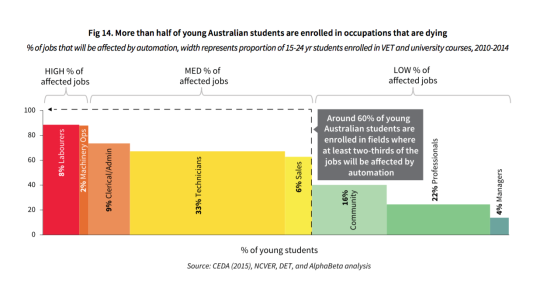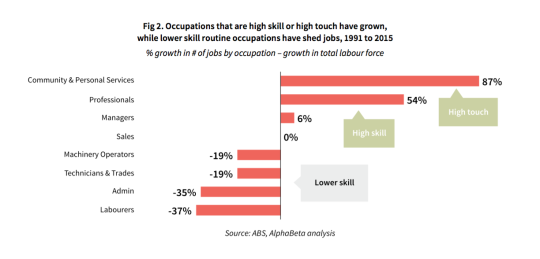on jobs, automation, and the future of work (part 2)
24 Jul 2016so dad has lost job and can’t get another one. some people at this point would say he should just retrain. he should take some time to learn a new skill and then he can find a job now that his old job is gone.
there are many things that make this difficult. first of all, the rate of change at which jobs are evolving is increasingly difficult to keep pace with. this, of course, is even more difficult as you age. can you imagine trying to teach a 50+ year old person who was on the road to retirement how to use twitter? sure, it’s possible, but it’s difficult. really difficult.
second, it’s not that the learning isn’t possible, it’s that it just doesn’t really make sense. once you reach a certain age, even if you can learn the skills, you just don’t live the same way because you grew up differently. even though my parents are on facebook, we will always use it differently because i’m a native to it and they aren’t.
finally, where those folks go to learn and gain new skills looks increasingly foreign. most people over 50 in america went to public schools that, more or less, were appropriate for the jobs they would work for their 30+ year careers. they also probably stopped at high school. nowadays, college is increasingly important and even colleges are failing at giving good educations. as long as we keep not investing in our public education systems, it’s only a matter of time before moocs (massively open online courses) and other education platforms take over. now try to imagine a 50+ year-old american learning in a mooc. it’s not impossible, but it’ll be pretty rough i imagine.
so that’s the problem with jobs and education at the older end of the spectrum. a few days ago, i got sent this report about the state of education for austrailians and it is not good.
the report, the new work order (lolpunny) from the foundation for young australians, details that most australians are being educated for jobs that are (a) at medium to high risk of being automated away soon or (b) in sectors that are shrinking (related or unrelated to automation). some of those shrinking sectors are because of structural changes being made as developed economies shift from an industrial to service-based economies.


crazy facts from the report:
Detroit 1990: The three largest companies had a combined market value of $65 billion (real) with 1.2 million workers. Silicon Valley 2014: The three largest companies had a combined market value of $1.09 trillion with just 137,000 workers.
as the altschool founder said in this newco interview, the purpose of our education systems should be to prepare our children for the future. however, our current american education systems don’t do that. they are based on transfer of basic information in order to prepare workers for factory labor. this method of information transfer is irrelevant when students have (effectively) all of human knowledge in the palms of their hands. that said, schools don’t have to be that way (sugata mitra has a big idea about how to make that happen). could renovated education systems work for people of all ages? maybe…
but before going down that road…
to be continued… part 3: all that can be automated will be automated and what that means for the creative economy.